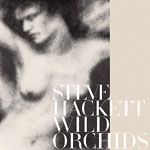Home » Jazz Articles » Album Review » Steve Hackett: Wild Orchids
Steve Hackett: Wild Orchids
That said, Wild Orchids may be the most pop-driven album of Hackett's career. But it's still a progressive album—although, with the inclusion of the Underworld Orchestra, one that fits into the symphonic arena. And while Hackett's recognizable electric guitar style is still there, the album is just as much about Hackett the writer.
Thirty years on there are still hints of Hackett's stylistic contributions to Genesis. The acoustic guitar-driven "Set Your Compass" directly references songs like "Entangled" from A Trick of the Tail (Atco, 1976). "Ego and Id" may rock more directly, but it's still a powerful vehicle for the rapid vibrato of Hackett's visceral electric guitar, using an array of effects including whammy bar, wah wah and controlled feedback. It also features Hackett's tapping style—an innovation that, dating back to Genesis' Selling England by the Pound (Atco, 1973), predated guitarist Eddie Van Halen's greater popularizing of the technique by at least five years.
"Waters of the Wild," with its electric sitar and sampled tabla, alludes to an interest in East Indian music, while the equally propulsive "Down Street," featuring Hackett's credible harmonica work, is a dark rocker with a demonic narrative. The pastoral feel of "To a Close" seems at odds with its more serious subject matter, delicate strings and Cor Anglais foreshadowing the instrumental and orchestral reading of the same theme on "She Moves in Memories."
The biggest surprise is Hackett's take on Bob Dylan's "Man In The Long Black Coat." Progressive fans may balk, but there's no sense of incongruity here, and the bluesy grit of Hackett's guitar playing isn't all that far removed from his signature style. But it's an aspect that Hackett has rarely spotlighted so vividly.
Captivating from start to finish, Wild Orchids combines Hackett's interest in orchestration with folkloric and pedal-to-the-metal progressive rock, resulting in the most seamless blend of Hackett the instrumentalist and Hackett the tunesmith since 1982's Highly Strung.
Track Listing
A Dark Night in Toytown; Waters of the Wild; Set Your Compass; Down Street; A Girl Called Linda; To a Close; Ego and Id; Man In The Long Black Coat; Wolfwork; Why; She Moves in Memories; The Fundamentals of Brainwashing; Howl.
Personnel
Steve Hackett
guitarSteve Hackett: guitars, electric sitar, harmonica, psaltery, optigan, voices; Roger King: keyboards, rhythm guitar; John Hackett: flute; Rob Townsend: saxes, flute, tin whistle, bass clarinet; Gary O'Toole: drums, harmony voices; Nick Magnus: keyboards; The Underworld Orchestra: Christine Townsend: principal violin, viola; Richard Stewart: cello; Dick Driver: bass; Colin Clague: trumpet; Chris Redgate: oboe, cor anglais.
Album information
Title: Wild Orchids | Year Released: 2006 | Record Label: InsideOut Music America
< Previous
Ira Sullivan
Comments
Tags
For the Love of Jazz
 All About Jazz has been a pillar of jazz since 1995, championing it as an art form and, more importantly, supporting the musicians who create it. Our enduring commitment has made "AAJ" one of the most culturally important websites of its kind, read by hundreds of thousands of fans, musicians and industry figures every month.
All About Jazz has been a pillar of jazz since 1995, championing it as an art form and, more importantly, supporting the musicians who create it. Our enduring commitment has made "AAJ" one of the most culturally important websites of its kind, read by hundreds of thousands of fans, musicians and industry figures every month.




















